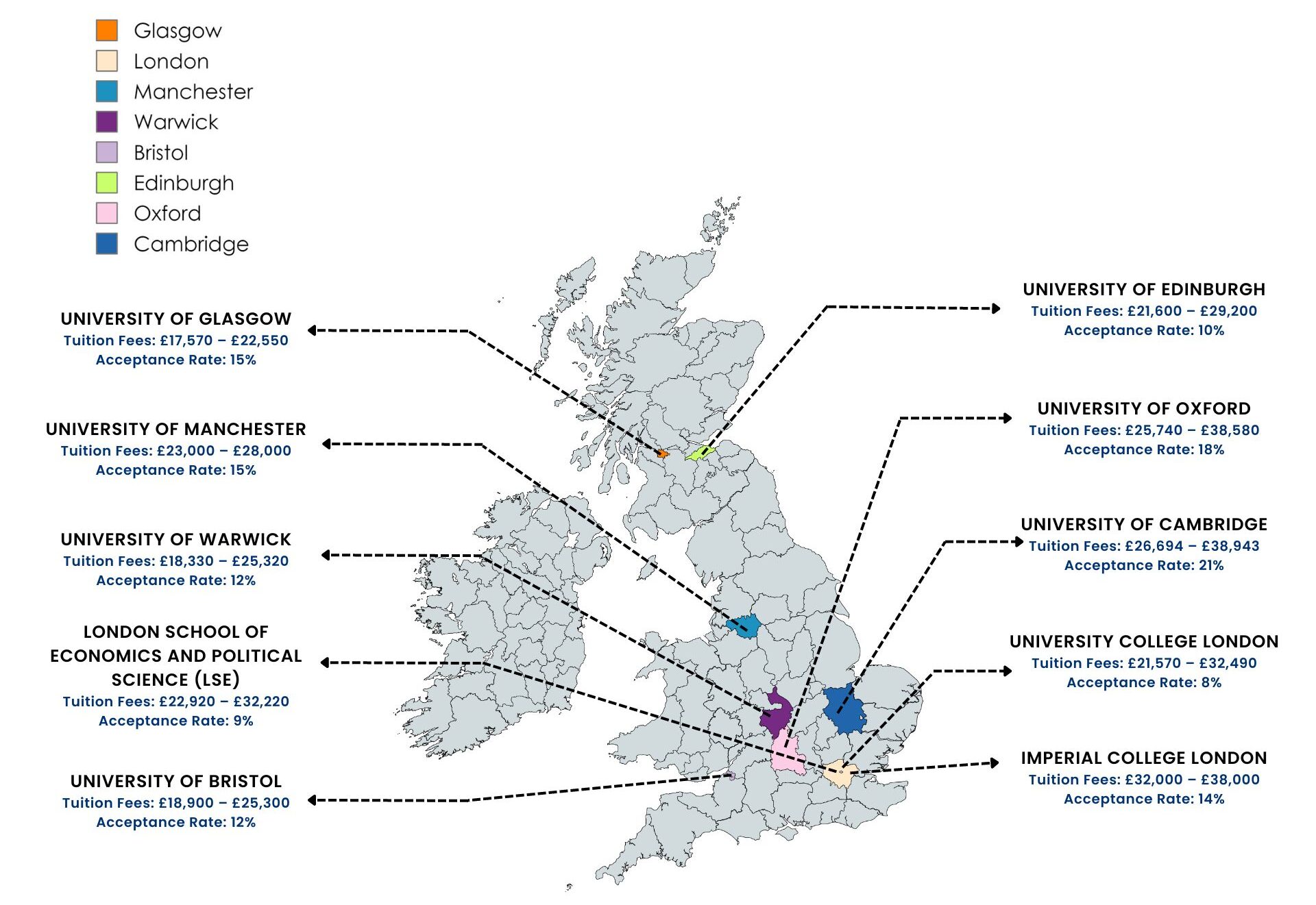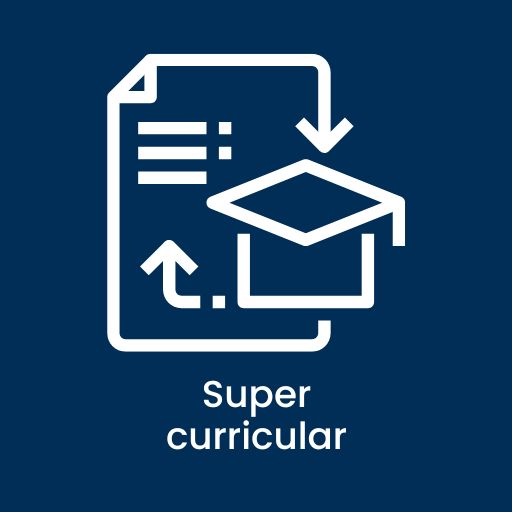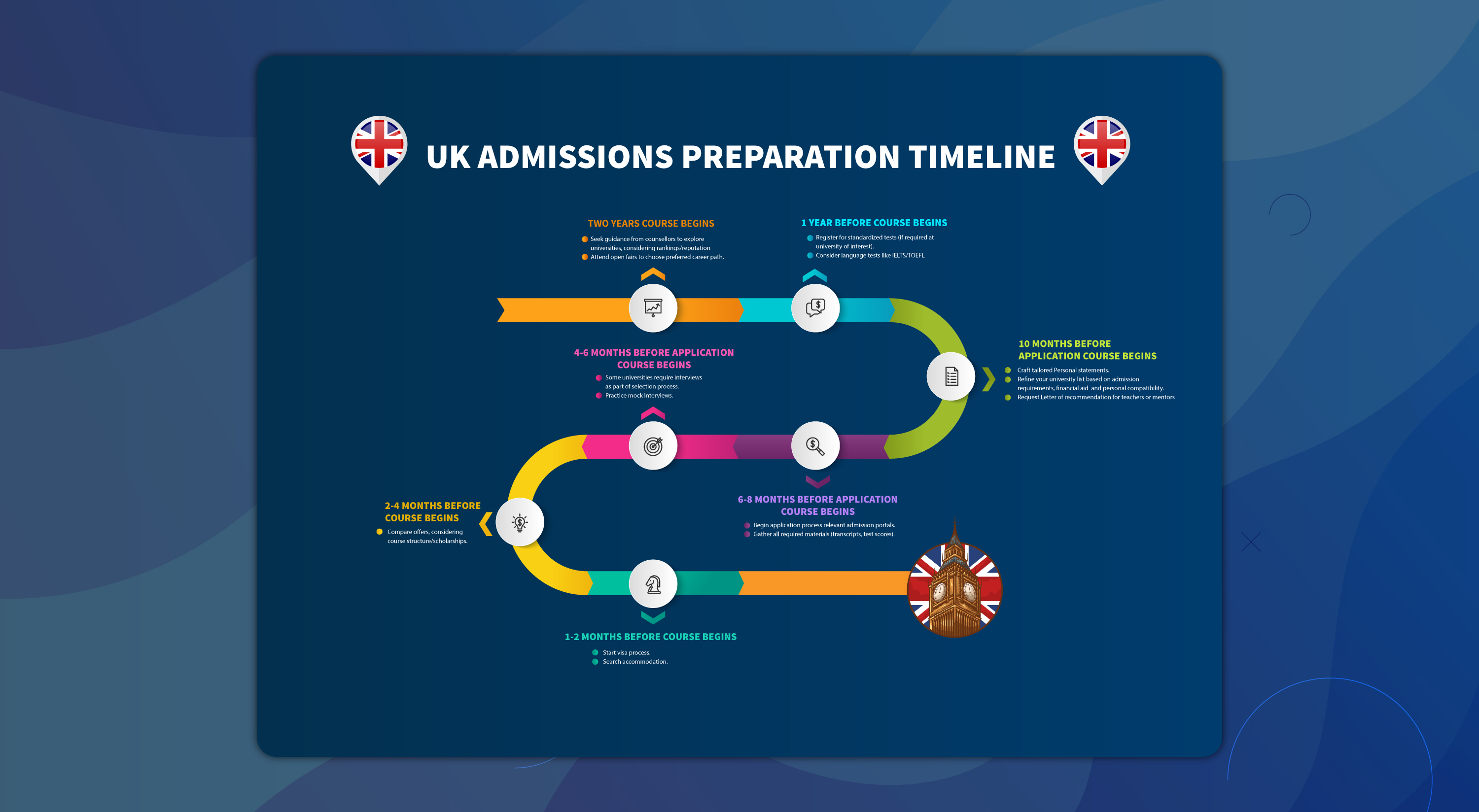How to apply to top UK universities
More than a million students from other countries choose to spend a year or more of their education in the United States, making it one of the most popular study abroad locations.
Why apply to UK universities?
Global Recognition: UK universities are globally renowned for their high-quality education and are consistently ranked among the top universities in the world.
Wide Range of Courses: From traditional subjects to emerging fields, there are options for everyone.
Vibrant Student Life: From student clubs and societies to cultural events and sports activities, there's always something happening on campus, allowing you to make the most of your university experience and create lasting memories.
Cultural Diversity: Studying in the UK provides an opportunity to experience a rich and diverse cultural environment.
Academic Excellence: UK universities are known for their rigorous academic standards and emphasis on research and critical thinking.
Networking and Career Opportunities: The UK offers excellent networking opportunities with its strong ties to industries and businesses.
Download our Successful College Application Guide
Our Guide is written by counselors from Cambridge University for colleges like MIT and other Ivy League colleges.
To join our college counseling program, call at +918825012255

Top 20 UK universities
| University | Tuition Fees (International) | Acceptance Rate | Most Popular Course |
|---|---|---|---|
| University of Oxford | £25,740 – £38,580 | 18% | Economics, Computer Science |
| University of Cambridge | £26,694 – £38,943 | 21% | Natural Sciences, Engineering |
| Imperial College London | £32,000 – £38,000 | 14% | Engineering, Medicine |
| UCL (University College London) | £21,570 – £32,490 | 8% | Medicine, Law, Psychology |
| London School of Economics and Political Science (LSE) | £22,920 – £32,220 | 9% | Economics, Social Sciences |
| University of Manchester | £23,000 – £28,000 | 15% | Medicine, Engineering |
| University of Edinburgh | £21,600 – £29,200 | 10% | Medicine, Computer Science |
| King’s College London | £19,500 – £29,850 | 12% | Law, Medicine, Psychology |
| University of Bristol | £18,900 – £25,300 | 15% | Engineering, Biological Sciences |
| University of Warwick | £18,330 – £25,320 | 12% | Business, Computer Science |
| University of Glasgow | £17,570 – £22,550 | 15% | Medicine, Law, Engineering |
| University of Southampton | £17,985 – £22,650 | 13% | Engineering, Medicine |
| University of Birmingham | £19,170 – £21,690 | 11% | Business, Computer Science |
| University of Leeds | £17,000 – £23,250 | 13% | Medicine, Business |
| University of Sheffield | £18,000 – £22,300 | 12% | Engineering, Medicine |
| University of Nottingham | £19,800 – £24,750 | 15% | Business, Engineering |
| University of St Andrews | £19,100 – £25,100 | 10% | International Relations, Medicine |
| Durham University | £20,300 – £27,600 | 15% | Business, Law, Natural Sciences |
| University of Exeter | £18,500 – £22,500 | 14% | Business, Engineering |
| University of Aberdeen | £18,000 – £23,000 | 14% | Medicine, Law, Engineering |
What kind of students are UK universities looking for?
UK universities are looking for students who demonstrate academic excellence, intellectual curiosity, and a genuine passion for their chosen field of study. They seek individuals who have a strong work ethic, critical thinking skills, and the ability to contribute to the academic and social community. UK universities also value diversity, creativity, leadership potential, and a commitment to personal growth. They welcome students who are open-minded, adaptable, and eager to engage in a global learning environment.

Application requirements
UCAS (Universities and Colleges Admissions Service) allows students to apply to a maximum of five universities or courses through their application system. This applies to both undergraduate and postgraduate applications.

Educational History
UK universities typically require applicants to have completed a recognized secondary education qualification, such as A-levels, International Baccalaureate (IB), or equivalent. Specific grade requirements vary depending on the university and course. Some programs may have subject-specific prerequisites as well.
University of Oxford
Oxford typically requires A-levels or their equivalent for undergraduate admissions. The specific grade requirements vary by course and may also consider subject prerequisites. For most courses, successful applicants often have AAA or higher in their A-levels (or equivalent qualifications).
University of Cambridge
Cambridge also sets high academic standards and considers A-levels or equivalent qualifications. Grade requirements differ by course and may have subject-specific prerequisites. Generally, successful applicants have AAA or higher in their A-levels (or equivalent qualifications).

UK Entrance Exams
Some courses and universities may require applicants to take specific entrance exams. For example, the University of Oxford and the University of Cambridge often require applicants to take additional exams, such as the Oxford Admissions Test (for certain subjects) or the Cambridge Assessment Admissions Test (for some courses).

Personal Statement
A personal statement is a crucial component of the application process. It is an opportunity for you to showcase your motivations, academic interests, relevant experiences, and future aspirations. The personal statement should highlight your suitability for the chosen course and demonstrate your ability to think critically and express yourself effectively.

Super curricular
Super curricular activities refer to any academic pursuits or extracurricular experiences that go beyond the standard curriculum. UK universities value applicants who have engaged in super curricular activities related to their chosen field of study. This can include independent research projects, attending lectures or workshops, participating in relevant competitions, or undertaking relevant work experience.

Reference Letter
Universities typically require one or more reference letters from teachers or mentors who can speak to your academic abilities, character, and potential. These letters should provide insights into your academic performance, personal qualities, and suitability for the chosen course.

Interviews
Some universities may conduct interviews as part of the admissions process, particularly for competitive courses or where further assessment is needed. Interviews can be conducted in person, over the phone, or via video call. The purpose of the interview is to assess your knowledge, skills, and suitability for the course, and to evaluate your communication and critical thinking abilities.
Key application stages & deadlines for UK universities
The deadlines to apply to US universities can vary depending on the institution and the specific program you’re interested in. However, we can provide you with some general guidelines for both the spring and fall semesters:
Research and Preparation
Begin researching universities and courses from September onwards. Research and shortlist universities and courses you are interested in. Consider entry requirements, course structure, facilities, and location. Begin preparations for required exams, such as the SAT, ACT, or UK-specific entrance exams like the BMAT, UKCAT, or LNAT if applicable.
Admissions Tests
Dates vary depending on the specific test. For example:
- BMAT (BioMedical Admissions Test): Usually held in late October or early November.
- UKCAT (UK Clinical Aptitude Test): Held between July and October.
- LNAT (National Admissions Test for Law): Offered multiple times between September and January.
Offers and Decisions
- Offers are typically sent out between December and May, with specific dates varying by university.
- May: Deadline for replying to offers and selecting firm (preferred) and insurance choices.
UCAS Application Submission
- Early September: UCAS applications open for submission.
- October 15th: Deadline for applications to Oxford, Cambridge, and most courses in medicine, dentistry, and veterinary medicine.
- January 15th: Deadline for most undergraduate courses for the majority of universities. This is the main deadline for the majority of courses.
Interviews
- Invitations are typically sent out between November and February.
- Interview periods usually take place from December through March, varying by university and course.
Examinations and Final Results
- May to June: Final exams such as A-levels or IB take place.
- August: Results are released.
Universities confirm places based on meeting offer conditions.
Key application stages & deadlines for UK universities
The deadlines to apply to US universities can vary depending on the institution and the specific program you’re interested in. However, we can provide you with some general guidelines for both the spring and fall semesters:






Timeline
Planning for UK university admission should ideally start about two years before the application deadline. Here are some key milestones to consider during the planning process:
Research and Exploration (Two Years Before):
- Begin researching universities and their respective courses.
- Consider factors such as rankings, reputation, course structure, location, and facilities.
- Attend university fairs, open days, or virtual events to gather more information.
- Start thinking about your preferred area of study and potential career paths.
Academic Preparation (Two Years Before):
- Ensure you are taking appropriate subjects and courses that align with your chosen field of study.
- Aim for strong academic performance to meet or exceed the entry requirements of your desired universities.
- Discuss your university aspirations with your school/college counselor or teachers for guidance. .
Standardized Tests (One Year Before):
- Determine if the universities you are interested in require any standardized tests.
- Register for the required tests and begin preparing accordingly.
- Consider taking language proficiency tests like IELTS or TOEFL if English is not your first language. .
University Shortlisting (One Year Before):
- Narrow down your list of preferred universities based on your research, course offerings, entry requirements, and personal preferences.
- Consider factors such as location, campus facilities, cost of living, and student support services.
- Seek advice from school/college counselors, teachers, or alumni who can provide insights into different universities. .
Personal Statement and Reference Letters (One Year Before):
- Begin drafting your personal statement, highlighting your academic achievements, extracurricular activities, and motivations for choosing the course and university.
- Request reference letters from teachers, mentors, or employers who can vouch for your abilities, character, and potential.
Application Submission (Six to Nine Months Before):
- Start the application process through the relevant admission portals of the universities you are applying to.
- Gather necessary documents such as academic transcripts, test scores, personal statement, reference letters, and any additional requirements specified by each university.
- Pay attention to application deadlines and ensure all documents are submitted within the specified timeframe. .
Scholarship and Funding Applications (Six to Nine Months Before):
- Research scholarship opportunities offered by universities or external organizations.
- Prepare scholarship applications and ensure you meet the eligibility criteria.
- Explore financial aid options, including grants, loans, or sponsorships. .
Interviews and Entrance Exams (Three to Six Months Before):
- Some universities may require interviews or entrance exams as part of the selection process.
- Prepare for these assessments by familiarizing yourself with common interview questions or exam formats.
- Practice mock interviews or seek guidance from mentors to enhance your performance. .
Acceptance and Confirmation (Three to Six Months Before):
- Receive admission decisions from universities.
- Compare offers, consider factors such as reputation, course structure, scholarships, and financial implications.
- Accept an offer and confirm your place by paying any necessary deposits or fees to secure your spot.
Visa Application and Accommodation (Three Months Before):
- If you require a student visa, start the application process and gather all necessary documents.
- Research and secure suitable accommodation options, whether on-campus or off-campus.
Remember, these milestones are general guidelines, and the specific timeline may vary depending on individual circumstances and university requirements. It’s important to thoroughly research and stay organized throughout the process to ensure a smooth and successful university admission journey.
Timeline
Planning for UK university admission should ideally start about two years before the application deadline. Here are some key milestones to consider during the planning process:
Speak to an Admission Advisor
Fill in your details and one of our expert advisors will contact you to organize a free education assessment, where you can get all your questions answered.










